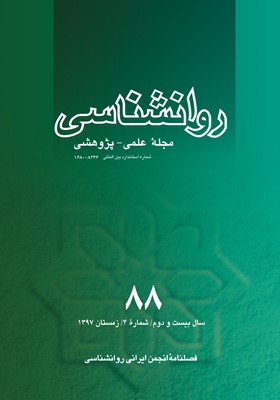رابطه ادراک مخاطره و نظمجویی شناختی هیجان با گرایش به اعتیاد با میانجیگری سبکهای تصمیمگیری
محورهای موضوعی : روانشناسیحسین زارع 1 , سوسن کنگاوری 2 , مهناز علی اکبری دهکردی 3
1 - گروه روانشناسی دانشگاه پیام نور، تهران
2 - گروه روانشناسی دانشگاه پیام نور، تهران
3 - گروه روانشناسی دانشگاه پیام نور، تهران
کلید واژه:
چکیده مقاله :
پژوهش حاضر با هدف تعیین رابطة ادراک مخاطره و نظم جویی شناختی هیجان با گرایش به اعتیاد با میانجی گری سبک های تصمیم گیری انجام شد. این پژوهش توصیفی و از نوع همبستگی می باشد. بدین منظور تعداد 023 نفر از دانشجویان مقطع کارشناسی دانشگاه پیام نور شهرستان بیجار با استفاده از روش نمونه گیری تصادفی، انتخاب گردیدند. داده ها به کمک شاخص ادراک مخاطره، پرسشنامه نظم جویی شناختی هیجان، پرسشنامه گرایش به اعتیاد زرگر و پرسشنامه سبک های تصمیم گیری اسکات و بروس جمع آوری شد. برای ارزیابی مدل پیشنهادی، از نرم افزار آموس و از روش تحلیل مسیر استفاده گردید. یافته ها نشان داد که ادراک مخاطره و نظم جویی شناختی هیجان مثبت به طور مستقیم با گرایش به اعتیاد رابطة منفی و معنادار و نظم جویی شناختی هیجان منفی با گرایش به اعتیاد رابطة مثبت و معنادار دارند. همچنین سبک های تصمیم گیری به صورت غیرمستقیم و واسطه ای بر میزان پیش بینی کنندگی متغیرها تاثیرگذار بودند. در مجموع نتایج پژوهش نشان داد که سبک های تصمیم گیری توانسته اند در رابطة مخاطره ریسک و نظم جویی شناختی هیجان با گرایش به اعتیاد نقش میانجی معناداری داشته باشند.
The aim of this study was to investigate the relationship between risk perception and cognitive emotion regulation with tendency to addiction by mediating decision-making styles. This research was a descriptive and a correlational study. To this end, 320 students from the Department of Banking and Payam of Noor University of Bijar city were selected by random sampling method. Data were collected using Risk Perception Index, Cognitive Emotion Regulation Questionnaire, Zargars Addiction Tendency Questionnaire and Scott and Bruce's Decision-Making Styles. Questionnaire. In order to evaluate the proposed model, Amos software and path analyze method were used. The findings showed that there was a negative significant relationship between risk perception and positive cognitive emotion regulation directly with the tendency to addiction and negative cognitive emotion regulation have a positive significant relationship with the tendency to addiction. Also, decision-making style indirectly influenced the predictive value of the variables. Overall, the results showed that decision-making style had a significant mediating role in the relationship between risk perception and cognitive emotion regulation with tendency to addiction.


